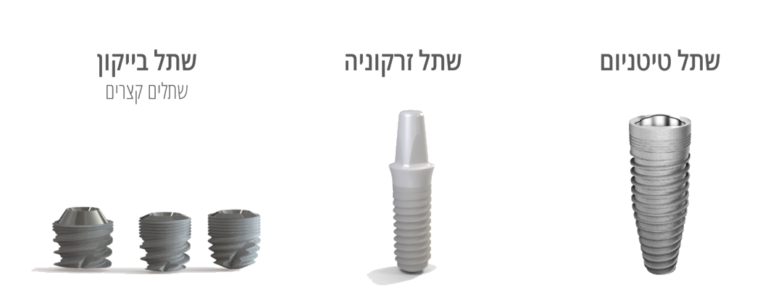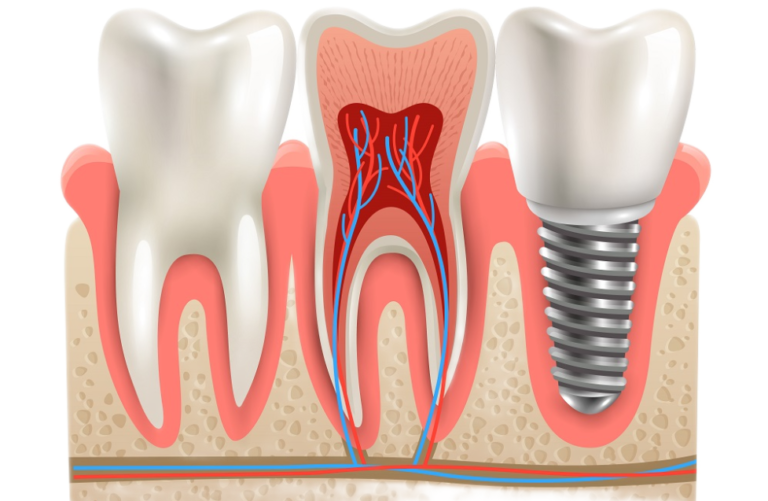Dental Implants in Tel Aviv
Advanced Dental Implants in Tel Aviv
Gara Clinic-an innovative medical center for dental implants in Tel Aviv offers you advanced technology and innovative treatment methods that allow you to undergo treatments with exceptional service. The center offers medical innovation and advanced technologies from Israel and from around the world, designed to significantly improve the quality of life for all patients. These advanced treatments make it possible to shorten the dental implant process significantly and minimize suffering and discomfort, along with perfect aesthetics and the world’s highest quality implant systems. The clinic staff appoints leading experts at an international level and provides dental care even in extreme cases of bone loss or systemic patients.
The clinic has at its disposal some of the most advanced implant systems in the world, including zirconia implants and bicon implants; they are short in different lengths and diameters. The innovative Gara Clinic has been carefully designed by the top designers, it is unique and exclusive, located in a pleasant and pastoral location that includes an ocean view, balconies overlooking the sea, with exquisite treatment rooms, recovery room, dental lab, advanced photo rooms and luxurious waiting room, all for our patients.
All dental treatments at the center in Tel Aviv, are carefully provided by a professional and leading team in its field. Dr. Nashat, director of the Gara Clinic, is considered one of the pioneers in the fields of oral rehabilitation, dental implants and complex dental treatments. Parallel to his work at the center, he runs a number of dental clinics including Israel and abroad.
What is dental implant?
Dental implants today are performed in a smooth and simple process in most cases, and even in very complicated cases like extreme bone loss, dental implants can be availed. A dental implant is actually an artificial root that is usually made of titanium; it is screwed to the jawbone and is an optimal solution in situations of one or more missing teeth. Dental implants are installed after a tooth extraction, prolonged gum disease, or when a patient suffers from one or more tooth deficiencies.
How is an implant performed?
With the help of a CT scan and a three dimensional X-ray, the dentist checks the thickness and the width of the jawbone and plans a process for a dental implant, taking into consideration the depth of the implant, its width, the angle at which it will be inserted and if a bone graft or sinus lift is necessary. After the implants are inserted, a crown, bridge or prosthesis can attach to the implants.
What are the benefits of the dental implants?
- Quality of life-an implant prevents the need for a prosthesis that can cause great suffering, sores in the mouth, rubbing, bad odor, or bone resorption. Dental implants allow the construction of a permanent crown or bridge and thus improves the chewing efficiency and does not cause the discomfort and suffering caused by a prosthesis in the mouth.
- Aesthetics-Implants help maintain the bone and gums as well as giving an aesthetic look similar to natural teeth. There are now non metallic zirconia implants, which come in a white color which is similar to the natural tooth color, this gives a natural appearance (when compared to titanium implants)
- High success rates-The success rates of dental implants are about 98%, which makes implant treatment a preferred solution in many/most cases.
Who is the transplant suitable for and when is it recommended?
Dental implants are suitable for almost anyone, with no age limit, this depends on the medical condition of the patient. Even in cases of chronic disease, a dental implant can be performed if the patient’s health condition is stable.
When one or more teeth are missing in the mouth, it is advisable to consult a dentist regarding the dental implants. Lack of tooth can cause future damage such as displacement of teeth, loss of jaw bone, gingivitis,functional impairment, aesthetic impairment. Even in cases of a denture that moves and causes sores in the mouth and discomfort, dental implants can be performed, which will significantly improve the patient’s quality of life.
Dental implants in one day: Who is it suitable for?
Many patients today can enjoy a dental implant in one day. Unlike conventional dental implants performed by installing dental implants in the jaw and making a removable denture which is not always convenient for the patient, and after several months (between 3-6 months) a permanent restoration is performed, one day dental implants allow the implants to be removed immediately. Removable prosthesis; this method is called “immediate loading”, this means that the implants are activated without a waiting period by installing temporary structures and crowns. We, at the innovative Gara Clinic for Dental Implants in Tel Aviv are skilled and qualified in performing dental implants of every type, using advanced methods even in complex cases.
Treatment by the 4 ALL ON method:
Dental implants which use the ALL-ON-4 method, 4 implants are performed at different angles, and a special metal and acrylic or porcelain prosthesis is screwed onto them.
Types of transplants
Titanium implants
Most implants today are made of titanium alloy, a metallic gray material. The metallic titanium implant may be reflected through the gums and reveal a grayish and unappealing color. Despite being the most common implants in the world, recent studies show that titanium particles are released into the tissues next to the implants and lymph nodes. A small percentage of people may suffer from an allergic reaction to titanium.
Zirconia implants
Zirconia implants are not made of metal, they are a ceramic material made with in special laboratory conditions, with excellent mechanical precision, corrosion resistance and with impressive aesthetic adjustments. One of the significant benefits of a zirconia implant is the aesthetic appearance it portrays. The color of the implant is white, similar to the color of the natural tooth and gives a better aesthetic look, especially with in the area of the smile line.
Short implants
The new generation of short implants that are especially suitable for certain medical conditions and bone loss. Often due to neglect or postponement of dental treatments there is bone loss, which does not allow the insertion of a standard implant and therefore the doctor must perform a bone graft first. Bone grafting involves complex surgery, sinus lift in cases of lack of bone in the upper jaw. Dental implants with bicon implants allow the insertion of implants without the need for a sinus lift or additional bone augmentation or adjustment, as well as implantation in boneless implants-all done with a minimally invasive process.

Factors in the success of transplant
- Proper diagnosis of the patient’s condition, selection of the appropriate treatment method and skill of the physician performing the transplant process.
- The quality of the implant will largely determine the success of the treatment.
- Cooperation on the part of the patient and adherence to all the doctor’s instructions after the dental implant.
Causes of transplant failure
• Proper diagnosis by the dentist is one of the critical things for the success of dental implants. Success is measured by the stability of the implant and the absorption of the implant into the jawbone. Improper diagnosis or improper implantation method for the patient’s case, may lead to the failure of the dental implant.
Poor oral hygiene, chronic gingivitis, smoking, diseases such as untreated diabetes, osteoporosis, heart disease, cancer, defective immune system can cause the implant to not be absorbed and for the transplant process to fail.
A method of treatment that does not suit the patient’s dental condition may jeopardize the success of the treatment. There are cases where a dental implant can be performed in one day using immediate loading, compared to other cases where it is advisable to wait several months to achieve proper stability of the implant.

Dental implants: frequently asked questions
What are the complications and risks of dental implants?
Dental implants are accompanied by a surgical procedure and any surgical operation involves complications and risks such as prolonged bleeding, hemorrhage, restriction in opening of the mout, infection from surgery. In addition, dental implants in the lower jaw can damage the mandibular nerve and dental implants in the upper jaw in the posterior areas, inevitably carry the risk of harm or damage to the nasal cavity or nasal cavities. The doctor’s experience in the field, his skill and thorough examination as well as following the instructions of the attending physician after the treatment, all contribute to the reduction of these risks and increase the chance of a successful result of the transplant.
Is a dental implant painful?
Dental implants in the Gara Clinic are performed almost painlessly. Thanks to the skill of the staff, high-end and sophisticated technology and advanced treatment methods, our patients undergo dental implants with a minimum amount of pain. The surgical procedure for implantation is not unusually painful, but there may be a slight discomfort during local anesthesia. The expectancy of pain after surgery is similar to what is felt after a tooth extraction and can be eliminated using painkillers.
In a short time you will be able to return to your routine, function with the new teeth and implants, and enjoy beautiful and strong teeth.
Can a dental implant fail?
The success of treatment depends on the knowledge and skill of the attending physician. If proper rehabilitation and transplantation is planned, the instructions of the attending physician are followed and the patient adheres to good oral hygiene daily and whoever necessary, then the success rate will be high. The data published today in professional literature indicates that about 98% of the time, success is resulted with dental implants.
How long does the implant last in the mouth?
The life span of the implant depends on a number of factors including the patient’s general health, oral hygiene, the degree of fusion created between the implant and the bone and the amount of weight applied to the implant. Technological improvements and advanced treatment methods, along with the skill and knowledge of the dentist in the field, can extend the duration of the oral implant to 20 years or more.
How much does a dental implant cost?
Many patients who need a dental implant often perceive the treatment as expensive but forget to take into account the real value -quality of life and oral health, this is an investment that can be for the rest of ones life. Investing in high quality implants that are installed by a skilled and experienced dentist, will serve you for a lifetime and can be the worthwhile investment you have made in your lifetime. Also, at Gara Clinic, a medical center for dental implants in Tel Aviv, almost anyone can undergo dental implant treatment, thanks to many payment options, payment schedule and non-bank financing. Sometimes a “cheaper” solution costs heavily in the physical result. We see patients who have undergone dental implants a few years ago and need comprehensive and expensive surgeries and treatments. We at Gera Clinic look at the overall picture in great detail and give a treatment plan with a guarantee that will last. Sometimes, a slightly higher investment is actually the most worth it long term solution.
What is a dental implant without surgery?
Non-surgical dental implantation is a computerized medical procedure. Using a digital scanner a dentist can see the bone in three dimensionally so that the doctor can decide where to place the implant. 3D imaging of the bone obviates the need for exposing gums and performing an invasive surgical procedure.
Is it obligatory to take X-rays before the transplant?
Implant insertion is a delicate surgical procedure and requires great care in order for dental implant treatment to be successful. It is important for the dentist to assess the height and width of the ridge with maximum accuracy to determine the ideal length and width of the implant in order to not to damage the adjacent teeth or oral tissues. Clinical examination alone, without X-rays is not enough to plan a quality and safe transplant. An X-ray that is performed before the transplant is a CT scan.
How long does it take to get back to regular routine after a dental implant?
The recovery process varies from patient to patient and depends on many factors. Usually the patient can return to routine around two days after surgery. There may be some mild pain after treatment that can be relieved with painkillers. After two weeks of surgery, there is usually no trace left of the surgery you underwent and you can return to your normal daily routine.


